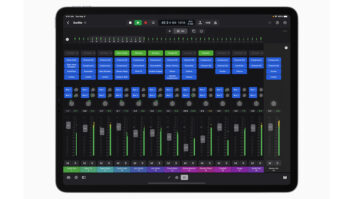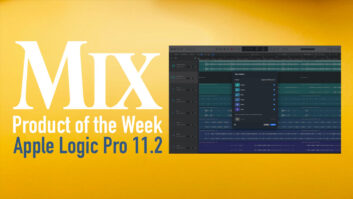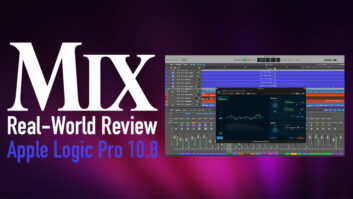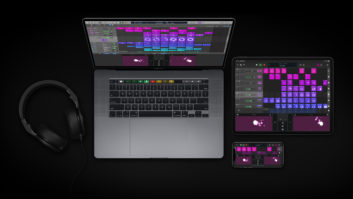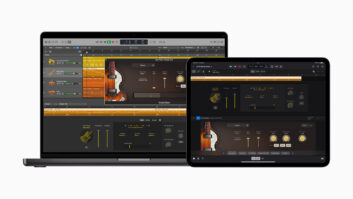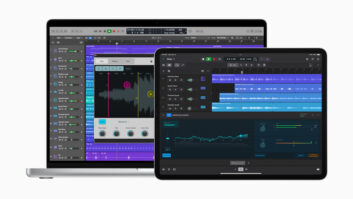Apple has ditched Logic Express and SoundTrack Pro, put Logic Pro 9 in the App store as download-only for $199.99, and priced MainStage 2 at $29.99. Whoa!

So what does this mean? Answer: No one knows yet. But however this story plays out—and Apple remains famously secretive about future plans—it underscores some important changes that potentially affect us all.
The end of the box, the reign of the pipe—Software has been trending downloadable, but it looks like the transition to download- only software will soon be complete. This makes economic sense for software companies: It takes the retailer’s markup out of the equation, eliminates physical inventory and meshes perfectly with today’s instant gratification mentality.
Take this one step further, though. Software programs are getting bigger, and download-only means more dependence on the net. We’re already hearing rumors that the major labels are planning to phase out the CD, and movies will be next to join the download club—they’re already mostly there—so it looks like we’ll be saying goodbye to jewel cases and DVD boxes, too. With software and data that lives in the cloud instead of on your desktop, the width of internet pipelines is going to differentiate the haves and have-nots. This is one reason for the concern over a 2-track internet, which would create a digital divide on purpose; if you deal with pro audio or video, you better hope you’re on the right side of the divide.
Uncertainty—This has always been an issue (will X work with Y two years from now, whether you’re talking OS compatibility or interface protocols?) but now there’s uncertainty about the direction a product itself will take. What happened with Final Cut Pro X may provide some clues… but maybe not. When it appeared, there was a huge backlash from pros who felt it was missing essential features required for pro video and taken a step backward into being a “pro” version of iMovie. They felt that FCPX’s destiny was now set in stone as prosumer software.
Supporters said it was a much needed overhaul of an aging code base, and although it wouldn’t open files from previous versions (!) and was missing features, this was more an issue of it being released too soon, and surely updates would follow that would plug these holes. Neither side has been proven 100 percent right yet, but it seems one of those scenarios will indeed be FCPX’s fate.
However, Logic Pro 9 is following a somewhat different narrative, as the new version has been released with some minor, but important, updates like multi-core offline bouncing. No functionality has been removed, so Logic remains a viable choice for professionals. The uncertainty revolves around whether it will continue to be updated to remain competitive and current with other applications, or whether Apple has simply decided to pursue the highly lucrative consumer market rather than the more specialized, and demanding, pro market.
The blurring of prosumer, pro and consumer—There used to be a sharp price- and featurebased division between pro and consumer gear. When I started in video, tape decks and switchers were very expensive, but now Sony’s under-$100 consumer version of Vegas does 50 times more than that tape-based setup ever did. By dumping Logic Express, Apple has turned Logic Pro into a one-size-fits-all proposition that’s inexpensive enough for consumers, yet powerful enough for pros. If this trend continues, audio and video software may adopt the videogame paradigm—an easy level to get started, with progressively more difficult levels opening up more aspects of the program—so the experience is scalable depending on the user’s level of expertise.
Music software may be a mature market—How many more tracks and plug-ins do we need? For companies that depend on new products to maintain cash flow, that’s a troubling question. But if they can’t continue selling to existing customers, they’ll need to reach a broader audience. It’s the “Fender Twin Reverb effect”: This remains a sought-after amp that keeps selling to new generations of guitarists, even while veterans hold on to their classic versions. Of course, the Twin Reverb has undergone changes over the years, but its fundamentals remain intact. Perhaps Logic will become Apple’s Twin Reverb—a few revisions here and there, but overall, staying true to its core.
You can always count on Apple to shake things up, and more often than not, its controversial calls have been on target (“What? They’re removing the floppy disk drive? That’s ridiculous!”). Maybe the changes with Logic signal the start of a phase-out, and a disengagement from the “pro” market. But it’s Apple, which forces the question that if it really is phasing out, what’s going to be phasing in?
Craig Anderton is executive editor of Electronic Musician magazine and editor in chief of harmonycentral.com.

